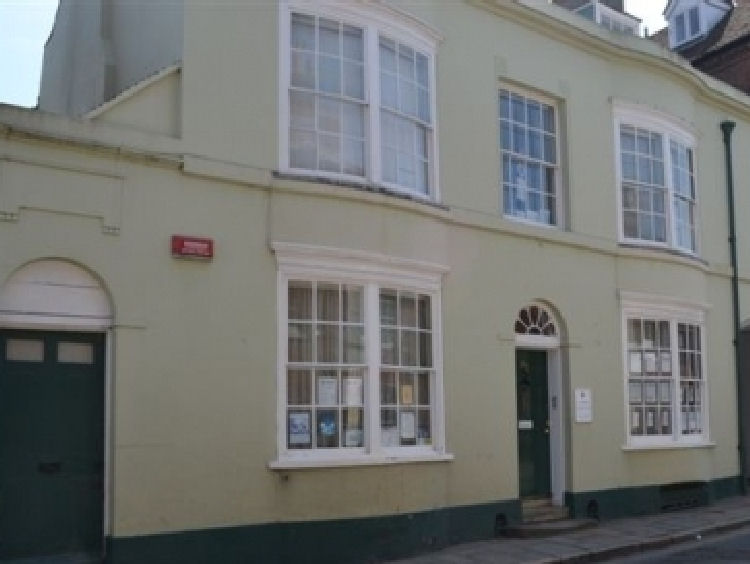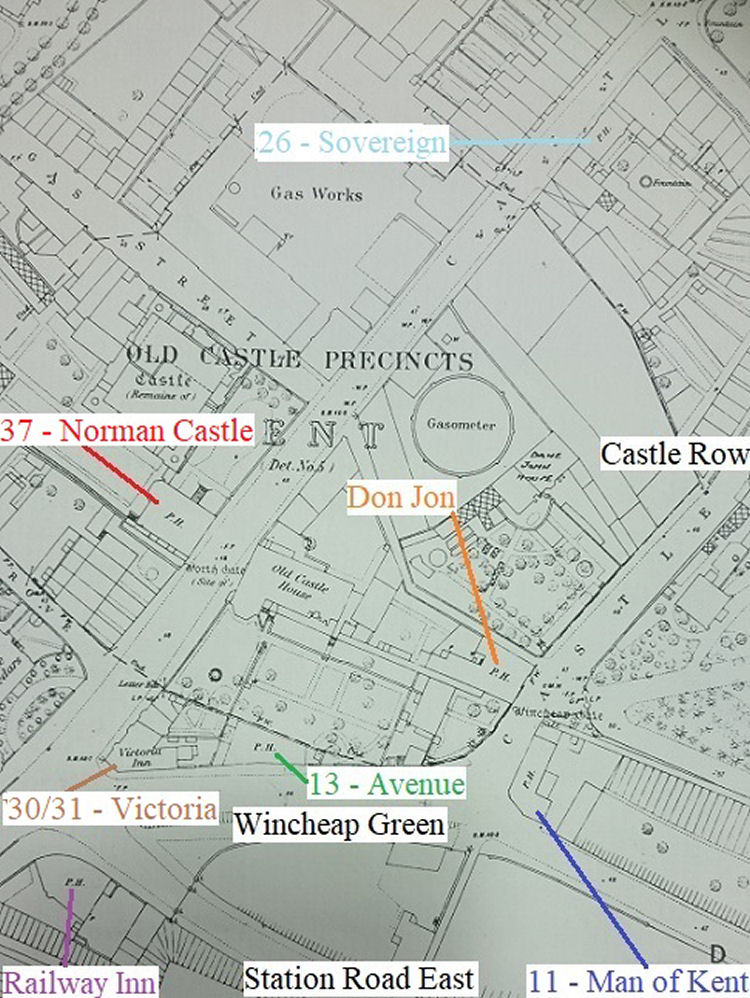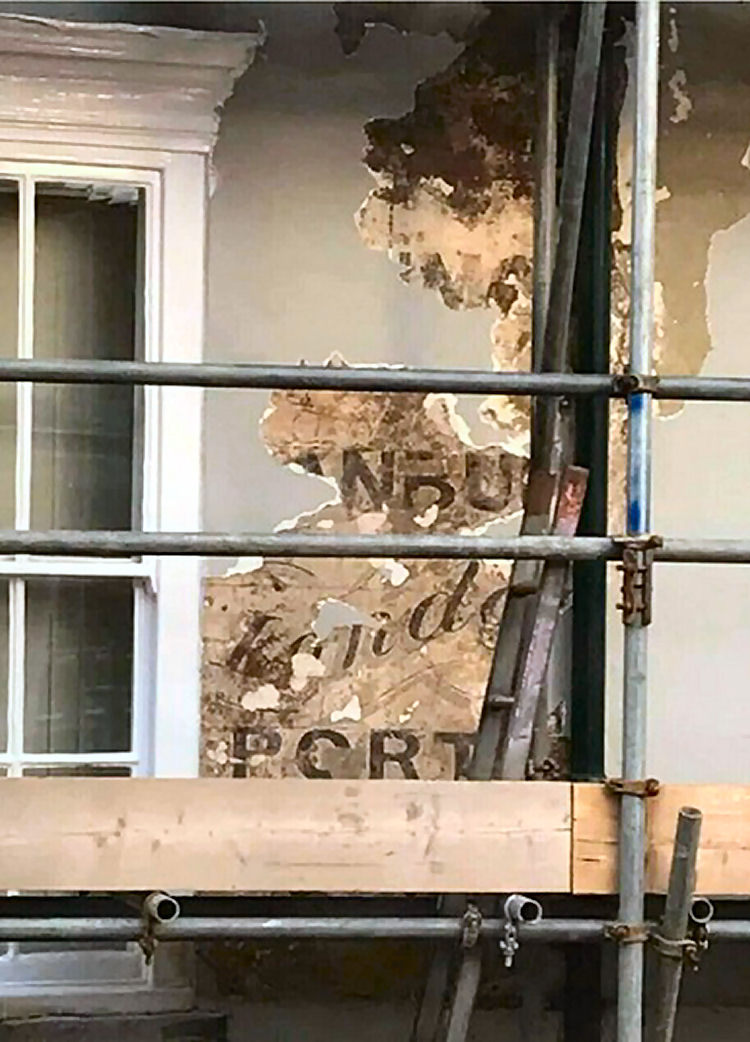|
From the Whitstable Times, 24 September, 1870.
IMPORTANT PROCEEDINGS AGAINST THE CANTERBURY GAS AND WATER COMPANY.
At the city Police Court, on Thursday, (before H. G. Austin, Esq., in
the chair, Alderman Masters, J. Hemery, Esq., and H. Cooper, Esq.,) the
Directors of the Canterbury Gas and Water Company were summoned for
poisoning wells in Castle-street, by allowing a leakage to exist at
their gas works twenty-four hours after notice had been given to the
company.
Mr. Webster, barrister, appeared far plaintiff; Mr. Bealey for the
defendants.
George Felix Finn, landlord of the “Sovereign,” was the complainant in
the first case.
In opening the proceedings, Mr. Webster remarked that the object of the
plaintiffs in taking out summonses against the company was not expressly
for extorting heavy penalties, but more for securing a pure supply of
water in future. In the case now before the Bench, the facts were
these:— Up to the commencement of the year, plaintiff had been supplied
with water through the company's old mains, the well on his premises
having far some time been closed, in consequence of the offsets of a
leakage from the gas works. Prior to opening the well, plaintiff
received a notice, from the directors, informing him that, as they had
adopted new works, the old supply would be discontinued; and Finn,
having a desire to make use of the well, determined to have it
re-opened, upon doing which the water therein was found to be poisoned
by being contaminated with percolations from the gas works. On making a
complaint of this, Finn was told he would find, if he emptied the well
of its contents, the new water which came in would be pure. Of course he
was only too pleased to try the experiment. The prospects held out were
not realised, however; the fresh water, as it found its way into the
well from the springs, being still more impregnated then that which was
taken out. The plaintiff was, therefore, induced to serve the company
with a notice on the 24th of August. Having observed that the company
had been re-incorporated, Mr. Webster proceeded to draw attention to the
Act of Parliament and to the clause defining the penalty to which the
company was subjected for creating such an offence—viz., a sum not
exceeding £200 as penalty, and £10 for every day that elapse after the
expiration of twenty-four hours after the service of the notice if the
evil is not remedied. He did not know what defence Mr. Bealey could make
to the charge—whether or not he would deny there was any leakage at all,
after the meetings the directors had held upon the subject of
contamination, and the resolution agreed to by them, whereby they
proposed terms to these whose wells had been injured; and surely after
this it could not be reasonable for them to come here and deny that any
leakage existed. There was no doubt whatever that the ammoniacal water
did escape from the gas-holder tank, that it percolated the soil, and
poisoned the water in the neighbouring wells, and it was for the purpose
of having their rights re-instated that the aggrieved persons had
instituted these proceedings.
The magistrates' clerk having read the notice served upon the directors,
which it appeared was worded under the auspices of the old company, the
following evidence was produced by Mr. Webster:
George Felix Finn deposed:— I have occupied the “Sovereign Inn” for a
period of five years, and during the greater part of that time I have
been supplied with water through the old pipes of the company. On
receiving a notice stating that the old supply would be discontinued and
a new one introduced, I determined to open the well in my cellar for the
purpose of ascertaining whether the water from the springs was pure, and
for this purpose I took the old water out and let the fresh in. The new
water as it came in was strongly impregnated with gas, which was
perceptible both as regards taste and smell. I examined the well also on
a subsequent occasion, with the same result, and have tested the water
again this morning, finding it still poisoned.
Mr. Webster was about asking Finn whether he was not aware of his own
knowledge that other wells in the locality had been similarly poisoned,
when Mr. Besley objected to the question, contending that the
magistrates were there simply investigating a complaint made by Finn,
not affecting any one else.
Mr. Webster appealed to the Bench. If the same means of poisoning the
plaintiffs well affected other wells, he argued that he had a right to
ask the question.
The magistrates thought it would be more in order for Mr. Webster to
confine himself to the case in which Mr. Finn was plaintiff.
Mr. Finn, in continuing his statement, said he remembered opening the
well in 1867, when the water appeared to be clear and good.
Cross-examined by Mr. Besley:— Under the old supply I had four taps in
my house from which I could obtain water—one in the cellar, two on the
ground floor, and one upstairs. Up to the time the old supply was cut
off I had the water gratuitously.
I prefer using well water, which I consider superior.
I believe there was a leakage from the gas-holder tank in 1854, but I
was not occupier of the “Sovereign” then. I had a supply of gas from the
company up to March, 1869, when I discontinued being a customer, and the
gas was cut off by my order. The escape which poisons my well could not
have emanated from the gas pipes, as the well is 3 ft. below them. I was
aware I had power to dig up the ground to ascertain if there was any
leakage from the main pipe, which is 15ft. or 20ft. from the well; but I
did not do so, as I did not think it probable the pollution took place
through any escape from the main. There was a cesspool 16ft. away from
the well. I admit that I want a conviction, and I suppose the penalty
will follow.
Re-examined:— I did not come here particularly to seek damages, but to
ensure a good supply of water, and to regain the exercise of my rights.
I did all I could to arrange the matter previously, but as I could not
agree to the terms offered by the company, I resorted to these
proceedings. If I had taken the new water, I should have expected to
have paid for it.
Mr. Webster said a suggestion having been thrown out that drainage might
be the cause of the pollution, he would call Mr. Cole to state to the
contrary.
George Cole, plumber and glazier, stated that in the coarse of his
experience he had opened seven wells, on examining the plaintiffs so
found the water strongly impregnated with gas, so much so indeed, as to
induce him to be positive that an escape of water from the gas-holder
tank was the cause thereof. The water in the bottle produced did not
bear traces of gas pollution, and it must have been taken from the top,
where the poisonous matter was not so perceptible as at the bottom.
Several meetings of persons who considered themselves aggrieved by being
deprived of the use of their wells had been held on different occasions,
and a deputation waited upon the directors, who passed a resolution
stating that water from the new works would be supplied at half price to
these persons whose wells appeared to be impregnated with gas, after an
examination had been made by their officer; but if the water was found
to be pure, the ordinary rate would be charged.
This being the conclusion of the case for the plaintiff,
Mr. Besley addressed the magistrates on behalf of the directors, and
firstly asked them to give their decision on the point whether the case
was properly before them. The wording of the notion he contended was not
correct, though that of the summer was; for in the former the directors
were indefinitely charged with allowing a leakage of gas washings,
whereas the formal and correct term specified by the Act was simply gas.
He made this objection because he urged that before a conviction could
be recorded it must be shown there was a leakage of gas; whereas up to
the present time no evidence had been called that related to anything
but gas washings. The mistake was evidently made by the notice being
framed under erroneous auspices—viz., an old Act of Parliament.
Mr. Webster said he must protest against any objection as to
jurisdiction being entertained at this advanced stage of the
proceedings.
The magistrates considered this was an improper time to raise such an
objection. It should have been made when the case was first brought
before them, and not at the adjourned hearing. The case was postponed at
their own instigation.
Mr. Besley, in resuming his address, alluded to the important nature of
the decision that would be given by the Bench upon the merits of the
case, which he asked them to balance well. They all knew how essential
it was that successful issue should attend joint stock enterprise; yet
of course he would not for a moment wish them to infer that in their
operations they were justified in poisoning wells or in injuring any
person; but especially in a company supplying two such important
elements in the enjoyment of life as gas and water was it desirable that
their management should be successful. If any grievance existed in this
instance it was not one for which the present company could be
considered responsible, but one which originated in 1854, and which had
been condoned for by an arrangement between the parties that they should
be supplied with water gratuitously, and the supply had been continued
under these circumstances ever since. Up to the time of the new works
being opened at the period, to which he referred back, there was an
escape from the gas-holder tank, caused by pure accident, and for which
no one was to blame. This was, however, as he had said, settled, by the
company giving a supply from their own works; and the question for
adjudication by the magistrates was whether they would convict the
company of an act committed in 1854, the pollution then accruing from
that which had now been remedied, as he should conclusively show in
evidence, as well as the fact that no offence had been committed during
the past six months, the time prescribed by the Act. He might remark
that the directors could not understand the necessity of the summonses
against them being multiplied, the others well knowing this case was
coming on; and if they meant to harass the directors he must ask the
Bench to consider whether the evidence in the first case justified them
in going into the others. He then called the following evidence: Harry
Good, manager of the company from 1839 to 1886, stated that about the
year 1852 a complaint was made of the leakage from the gas-holder tank,
and an arrangement was made with the occupier of the “Sovereign” on
account of the poisoning of his well. Mr. Webster did not see how this
agreement, made with a previous tenant to Finn’s predecessor, could in
any way be taken to relate to the present case. He objected to such
evidence being taken The Bench also thought it had no bearing upon the
summons.
Mr. Good continued:— The water round the gasholder was for sealing the
vessel. The tank is 40ft. deep. (Witness afterwards corrected this part
of his evidence, stating the depth was 16ft.) At the time he alluded to,
the holder was out of repair, the puddling with which it was encircled
being defective. Attempts were made to repair it, but it was not made a
good job.
Edward Eves, inspector, said the water was put on at the “Sovereign” in
1856, and was continued up to last year. There was no leakage whatever
in that neighbourhood at the present time. In cross-examination, he
admitted he had not taken up all the mains.
Robert K. Moorhouse, the present manager, said there had been no leakage
from the gas-holder tank since he had been manager; if there had, he
should have found it out by the quantity in the decreasing; and it had
not been found necessary to pump fresh water in.
Cross-examined:— Altogether, they had three tanks, two of which had
required water, but the one on the same side of the road as plaintiff’s
house had not.
Mr. James Burch, secretary, said in 1868 the gasholder tank in question
was found to leak, and by order of the directors it was emptied and
repaired thoroughly. In July last year he tested the retentive powers of
the tank, by taking the level of the water twice—the second time,
twenty-four hours after the first, when he found the level precisely the
same.
Cross-examined:— He had nothing to do with the practical management of
the works. There was a leakage from one of the tanks, but this was
seventy yards away from the plaintiff’s premises. There was no leakage
from the one near the “Sovereign.”
This being the whole of the evidence, the magistrate retired, and after
some deliberation they returned into Court; when the Chairman said they
had unanimously arrived at the decision that the case was proved. They
fined the company £30 penalty, and ordered them to pay 10s. for every
day after twenty-four hours since the service of the notice. The Court
would be adjourned until three, when the other cases would be heard.
Mr. Beeley stated that as the directors intended to appeal, they hoped
the other cases would not be gone into at present.
Mr. Webster had no objection to their being adjourned, but as the
circumstances were different in each case, one decision could not, he
thought, apply to all the summonses.
The cases were then adjourned until the 24th of October.
|



